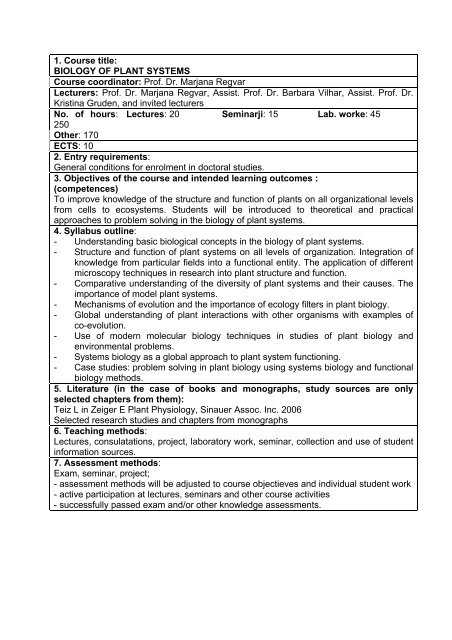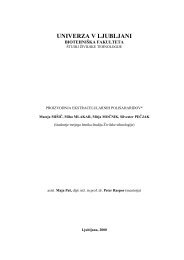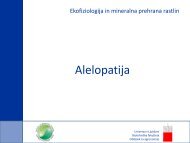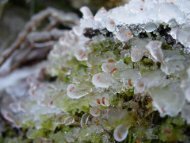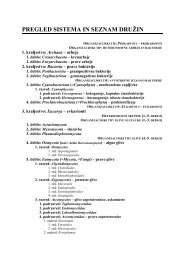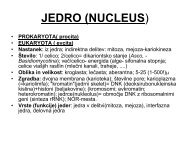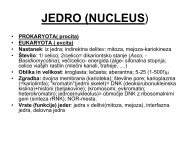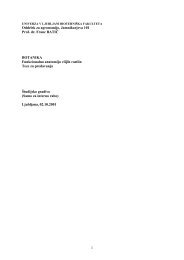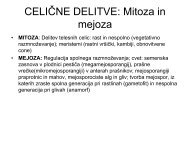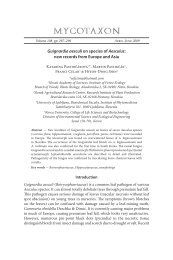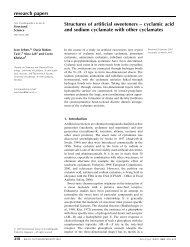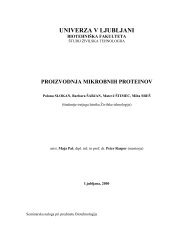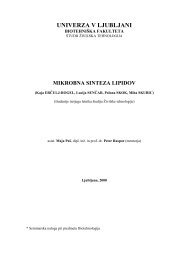- Page 1 and 2: 1. Subject curricula - Basic subjec
- Page 3 and 4: SCIENTIFIC FIELD NAME OF COURSE AGR
- Page 5 and 6: 1. Course title: AGROECOSYSTEMS AND
- Page 7 and 8: 48. [COBISS.SI-ID 5166201] JCR IF (
- Page 9 and 10: 1. Course title: BIOTIC INTERACTION
- Page 11 and 12: Urek Gregor 1. UREK, Gregor, ŠIRCA
- Page 13 and 14: Bell,J.N.B., Treshow, M., 2003. Air
- Page 15 and 16: 1. Course title: BIOINFORMATICS Cou
- Page 17: 21(3):396-8. 3. Van Driessche N, De
- Page 21 and 22: Bulog Boris 1. MIHAJL, Katarina, JE
- Page 23 and 24: 1. Course title: ECOLOGY Course coo
- Page 25 and 26: Slovenia. Limnol., 2007, vol. 37, p
- Page 27 and 28: 1. Course title: EVOLUTION AND SYST
- Page 29 and 30: Opiliones, Sironidae) from Eastern
- Page 31 and 32: esearch into olfaction. Their resea
- Page 33 and 34: elem. res., 2005, vol. 106, p. 253-
- Page 35 and 36: 1. Course title: PLANT BIOTECHNOLOG
- Page 37 and 38: among wild and cultivated hops (Hum
- Page 39 and 40: 1. Course title: BIOTECHNOLOGY OF V
- Page 41 and 42: Simon, DUNCAN, Jackie, HOCHSCHEID,
- Page 43 and 44: 1. Course title: MICROBIAL BIOTECHN
- Page 45 and 46: JANEŠ, Damjan, 3. 3. KREFT, Samo,
- Page 47 and 48: e. Presentation of research work -
- Page 49 and 50: 1. Course title: ECONOMICS OF NATUR
- Page 51 and 52: areas. Journal of central european
- Page 53 and 54: Štampar Franci 1. ŠTURM, Karla, H
- Page 55 and 56: soil and environment, 2003, vol. 49
- Page 57 and 58: GmbH Co.:200 p. ISBN 3-8001-3139-0
- Page 59 and 60: [COBISS.SI-ID 17870809] JCR IF: 1.9
- Page 61 and 62: 165 - 171 6. Teaching methods: The
- Page 63 and 64: landschap. V: KERKSTRA, Klaas (ur.)
- Page 65 and 66: iocomposites. Nanoparticles made fr
- Page 67 and 68: 3. MUHIČ, Simon, MAZEJ, Mitja, BUT
- Page 69 and 70:
Bucur V. 2003. Nondestructive Chara
- Page 71 and 72:
5, št. 2, p. 101-116, ilup. [COBIS
- Page 73 and 74:
- Interaction between nanoparticles
- Page 75 and 76:
microbiol. lett.. [Print ed.], 2004
- Page 77 and 78:
1. Course title: NUTRITION Course c
- Page 79 and 80:
3. MOZETIČ, Branka, SIMČIČ, Marj
- Page 81 and 82:
Peter, POKLAR ULRIH, Nataša. Effec
- Page 83 and 84:
1. Course title: BIOENGINEERING IN
- Page 85 and 86:
3. ČEH, Barbara, TAJNŠEK, Anton.
- Page 87 and 88:
Christensen, C. M., Raynor, M. E. T
- Page 89 and 90:
Machines, 2nd ed., St. Jospeh : Ame
- Page 91 and 92:
webs, factors thet balance the dyna
- Page 93 and 94:
1. Course title: MANAGING FOREST EC
- Page 95 and 96:
3. DIACI, Jurij, PISEK, Rok, BONČI
- Page 97 and 98:
Cambridge, UK. ii+ 26 pp. Phillips,
- Page 99 and 100:
1. Course title: QUANTITATIVE AND S
- Page 101 and 102:
1. Course title: ANIMAL PRODUCTION
- Page 103 and 104:
1. Course title: DYNAMICS OF CELL A
- Page 105 and 106:
Kostanjšek Rok 1. ČEPELJNIK, Tade
- Page 107 and 108:
1. Course title: MOLECULAR PHYSIOLO
- Page 109 and 110:
Kralj-Iglič Veronika 1. IAMBROŽI
- Page 111 and 112:
Turk Tom 1. BERNE, Sabina, SEPČIĆ
- Page 113 and 114:
2. SEDMAK, Bojan, ELERŠEK, Tina. M
- Page 115 and 116:
selected chapters from them): Da-We
- Page 117 and 118:
Galić Kata: 1. S. Mrkić, K. GALI
- Page 119 and 120:
ed., Ames (Iowa): Blackwell Publish
- Page 121 and 122:
Zeitschrift für Lebensmittel-Unter
- Page 123 and 124:
SCIENTIFIC FIELD TITLE OF COURSE AG
- Page 125 and 126:
WOOD AND BIOCOMPOSITES NANOSCIENCES
- Page 127 and 128:
1. Course title: ANALYSIS OF ORGANI
- Page 129 and 130:
1. Course title: DETERMINATION OF H
- Page 131 and 132:
3. HREN, Matjaž, BOBEN, Jana, ROTT
- Page 133 and 134:
- seminars and laboratory practical
- Page 135 and 136:
8. References: Batič Franc 1. ŠIR
- Page 137 and 138:
7. Assessment methods: Seminar pres
- Page 139 and 140:
Wilson N. 1995. Soil Water and Grou
- Page 141 and 142:
Students are familiarised in labora
- Page 143 and 144:
Total Environment, 291: 1 - 32 Oliv
- Page 145 and 146:
1. Course title: STATISTICAL METHOD
- Page 147 and 148:
1. Course title: BREEDING AND PROPA
- Page 149 and 150:
1. Course title: SCIENTIFIC INFORMA
- Page 151 and 152:
1. Course title: CHEMISTRY AND BIOC
- Page 153 and 154:
1. Course title: COMPUTER STUDIES F
- Page 155 and 156:
1. Course title: BIOLOGY FOR NON-BI
- Page 157 and 158:
1. Course title: ACQUISITION, MANAG
- Page 159 and 160:
1. Course title: COMPUTER-ASSISTED
- Page 161 and 162:
1. Course title: FEEDBACK CONTROL I
- Page 163 and 164:
1. Course title: ECOLOGY OF ASSOCIA
- Page 165 and 166:
1. Course title: PHYSICAL ANTHROPOL
- Page 167 and 168:
Course title: ANALYTICAL AND RESEAR
- Page 169 and 170:
3. GRDADOLNIK, Jože, GOLIČ GRDADO
- Page 171 and 172:
1. Course title: PLASMIDS Course co
- Page 173 and 174:
1. Course title: SYSTEMATICS OF HIG
- Page 175 and 176:
1. Course title: SELECTED CHAPTERS
- Page 177 and 178:
1. Course title: STATISTICAL ANALYS
- Page 179 and 180:
1. Course title: BIOLOGY OF WATER P
- Page 181 and 182:
1. Course title: SELECTED METHODS I
- Page 183 and 184:
1. Course title: WHITE BIOTECHNOLOG
- Page 185 and 186:
1. Course title: MICROREMEDIATION O
- Page 187 and 188:
1. Course title: PLANNING RESEARCH
- Page 189 and 190:
1. Course title: BIOTECHNOLOGY FOR
- Page 191 and 192:
1. Course title: USE OF FUNGAE FOR
- Page 193 and 194:
of wood damaging fungi and macrofun
- Page 195 and 196:
V. Hessel, H. Löwe, A. Müller, G.
- Page 197 and 198:
esource for preparing seminar tasks
- Page 199 and 200:
5. Literature (in the case of books
- Page 201 and 202:
fragment of PFK1 with Crabtree posi
- Page 203 and 204:
Lecture notes. WILLSON, K., WALKER,
- Page 205 and 206:
Kos Janko 1. DOLJAK, Bojan, OBERMAJ
- Page 207 and 208:
eflection fluorescence microscopy)
- Page 209 and 210:
8. References: Neža Čadež 1. ZIM
- Page 211 and 212:
emissions of greenhouse gases and p
- Page 213 and 214:
1. Course title: MANAGEMENT OF BIOT
- Page 215 and 216:
1. Course title: MATHEMATICAL SECTO
- Page 217 and 218:
issue in Slovenia. East. Europ. eco
- Page 219 and 220:
study. Acta agric. Slov.. [Tiskana
- Page 221 and 222:
in management and finance. Addison-
- Page 223 and 224:
1. Course title: ECONOMIC AND SOCIO
- Page 225 and 226:
agriculture land in Slovenia = Vzro
- Page 227 and 228:
5. Literature (in the case of books
- Page 229 and 230:
1. Course title: DEVELOPMENT DIRECT
- Page 231 and 232:
1. Course title: INTERACTION BETWEE
- Page 233 and 234:
1. Course title: SELECTED CHAPTERS
- Page 235 and 236:
1. Course title: SELECTED CHAPTERS
- Page 237 and 238:
1. Course title: METHODS OF EXTRACT
- Page 239 and 240:
Course title: SPECIFIC CONTENTS OF
- Page 241 and 242:
1. Course title: ASSESSING GENETIC
- Page 243 and 244:
genetics & heredity, x: 3.644 Šuš
- Page 245 and 246:
7. Assessment methods: Seminar or e
- Page 247 and 248:
Toš, Igor: Arhitektura in sistemol
- Page 249 and 250:
Environment and Behaviour. Sage, Lo
- Page 251 and 252:
8. References: Marušič Janez 1. M
- Page 253 and 254:
Arnstein S. 1969. A ladder of citiz
- Page 255 and 256:
Strategic assessment of policies. S
- Page 257 and 258:
1. Course title: THEORY OF DESIGN C
- Page 259 and 260:
1. Course title: TYPOLOGY OF THE CU
- Page 261 and 262:
1. Course title: BIOLOGICAL PROCEDU
- Page 263 and 264:
1. Course title: XYLOGENESIS AND PL
- Page 265 and 266:
1. Course title: WOOD CONSTRUCTIONS
- Page 267 and 268:
1. Course title: SURFACE TREATMENT
- Page 269 and 270:
1. Course title: RE-ENGINEERING IN
- Page 271 and 272:
1. Course title: RHEOLOGY AND STREN
- Page 273 and 274:
1. Course title: MANIPULATION AND D
- Page 275 and 276:
1. Course title: COLLOIDS Course co
- Page 277 and 278:
1. Course title: BIOPHYSICS OF MEMB
- Page 279 and 280:
y anisotropic membrane inclusions,
- Page 281 and 282:
2. Bohinc K., Slivnik T., Iglic A.,
- Page 283 and 284:
6. Teaching methods: Basic theory a
- Page 285 and 286:
1. JAMNIK, Polona, RASPOR, Peter. M
- Page 287 and 288:
7. Assessment methods: Seminar task
- Page 289 and 290:
Lectures, seminar work, laboratory
- Page 291 and 292:
7. Assessment methods: Verigficatio
- Page 293 and 294:
1. Course title: PROBIOTICS Course
- Page 295 and 296:
Orel Rok 1. OREL, Rok, MLINARIČ, V
- Page 297 and 298:
detection of Campylobacter coli in
- Page 299 and 300:
selected chapters from them): Albri
- Page 301 and 302:
Renius, K,Th: gesamtentwicklung Tra
- Page 303 and 304:
Lectures, independent study and pre
- Page 305 and 306:
Vogel, G.H., Process Development, W
- Page 307 and 308:
2002; Macdonald DM. Practical machi
- Page 309 and 310:
and mechanical power; measurement o
- Page 311 and 312:
Selected chapters 6. Teaching metho
- Page 313 and 314:
selected chapters from them): Incro
- Page 315 and 316:
und Weiterentwicklung Technischer P
- Page 317 and 318:
Christensen, C. M., Raynor, M. E. T
- Page 319 and 320:
Noise control: at the source, on th
- Page 321 and 322:
1. Course title: DYNAMICS OF MACHIN
- Page 323 and 324:
1. Course title: SELECTED CHAPTERS
- Page 325 and 326:
1. Course title: TECHNICAL INFORMAT
- Page 327 and 328:
1. Course title: TECHNICAL MATERIAL
- Page 329 and 330:
tasks in terms of materials and mat
- Page 331 and 332:
7. Biogeochemical cycles. 8. Physio
- Page 333 and 334:
1. Course title: MATMATHEMATICAL MO
- Page 335 and 336:
1. Course title: METHODS OF ECOLOGI
- Page 337 and 338:
1. Course title: RESEARCH IN DENDRO
- Page 339 and 340:
KASTELEC, Damijana, MAVSAR, Robert,
- Page 341 and 342:
publishers, 394 s. Hans-Peter Kahle
- Page 343 and 344:
populations of herbivorous insects
- Page 345 and 346:
1. Course title: ANALYSIS OF PARAME
- Page 347 and 348:
1. Course title: SELECTED CHAPTERS
- Page 349 and 350:
1. Course title: MICROSCOPY AND IMA
- Page 351 and 352:
p. 26-29. [COBISS.SI-ID 2460794], J
- Page 353 and 354:
Current scientific periodicals, rev
- Page 355 and 356:
Endocytotic activity of bladder sup
- Page 357 and 358:
damaged by cyclophosphamide treatme
- Page 359 and 360:
Books News and Co. Portland, USA) P
- Page 361 and 362:
1. Course title: LINKAGE OF SENSORI
- Page 363 and 364:
(Coleoptera: Chrysomelidae). Acta A
- Page 365 and 366:
Advances in thermal and nonthermal
- Page 367 and 368:
1. Course title: CONTEMPORARY TECHN
- Page 369 and 370:
3. BEROVIČ, Marin, PIVEC, Aleksand
- Page 371 and 372:
SCIENTIFIC FIELD COURSE TITLE RESPO
- Page 373 and 374:
Molecular Microbial Ecology Manual.
- Page 375 and 376:
microorganisms; expression proteomi
- Page 377 and 378:
1. Course title: IMMUNOLOGICAL EXPE
- Page 379 and 380:
1. Course title: USE OF MAGNETIC RE
- Page 381 and 382:
1. Course title: INTERACTION OF PRO
- Page 383 and 384:
1. Course title: BIOACTIVE MOLECULE
- Page 385 and 386:
1. Course title: ANTIOXIDANTS AND T


